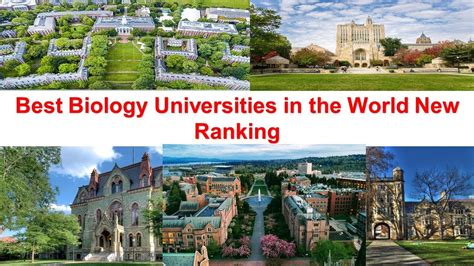Introduction
Biology, the study of life, offers a fascinating and ever-evolving field for students seeking a deeper understanding of the natural world. With advancements in technology and research, the demand for skilled biologists continues to grow, making it an excellent choice for those seeking a rewarding career path. This guide presents a comprehensive list of the best biology undergraduate schools, providing aspiring biologists with valuable information to make informed decisions about their academic journey.

Top Biology Undergraduate Schools
The following institutions have consistently ranked among the top biology undergraduate programs in the United States, according to reputable sources such as U.S. News & World Report, the Princeton Review, and College Factual.
| Rank | University | Location |
|---|---|---|
| 1 | Massachusetts Institute of Technology (MIT) | Cambridge, MA |
| 2 | Harvard University | Cambridge, MA |
| 3 | Stanford University | Stanford, CA |
| 4 | Yale University | New Haven, CT |
| 5 | University of California, Berkeley | Berkeley, CA |
| 6 | Princeton University | Princeton, NJ |
| 7 | University of Washington | Seattle, WA |
| 8 | Carnegie Mellon University | Pittsburgh, PA |
| 9 | University of California, Los Angeles (UCLA) | Los Angeles, CA |
| 10 | Johns Hopkins University | Baltimore, MD |
Factors to Consider When Choosing a Biology Undergraduate Program
Aspiring biologists should consider the following factors when selecting a university:
- Faculty Expertise: Seek programs with renowned faculty members who are actively engaged in cutting-edge research.
- Research Opportunities: Look for institutions that provide undergraduate research opportunities, allowing students to gain hands-on experience.
- Lab Facilities: Consider the quality and availability of laboratory facilities, which are essential for practical training.
- Course Curriculum: Review the course curriculum to ensure it aligns with your academic interests and career goals.
- Student Life and Campus Culture: Explore the campus culture, student organizations, and social support available.
- Location: Consider the location of the university and its proximity to research institutions or biotechnology hubs.
Types of Biology Undergraduate Programs
Biology undergraduate programs typically offer a range of specializations, including:
- General Biology: Provides a broad foundation in the core principles of biology.
- Biochemistry: Focuses on the structure and function of biological molecules.
- Cell and Molecular Biology: Explores the fundamental processes of cells and molecules.
- Developmental Biology: Studies the development of organisms from inception to adulthood.
- Ecology: Investigates the interactions between organisms and their environment.
- Evolutionary Biology: Examines the mechanisms underlying the evolution of species.
- Microbiology: Studies microorganisms and their interactions with humans and the environment.
- Physiology: Examines the function and regulation of living organisms.
Career Prospects for Biology Graduates
Biology graduates have a wide range of career opportunities, including:
- Research Scientist: Conduct laboratory-based research in academia or industry.
- Biotechnologist: Develop and apply biological processes to solve problems in fields such as medicine, agriculture, and environmental science.
- Environmental Scientist: Protect and restore the environment.
- Healthcare Professional: Become a physician, nurse, or other healthcare provider.
- Science Writer: Communicate scientific information to the public.
- Teacher: Educate students in biology at the K-12 or college level.
Conclusion
Choosing the right biology undergraduate program is a crucial step in embarking on a successful career in the field. By carefully considering the factors outlined in this guide, aspiring biologists can identify the best institutions that align with their academic and career aspirations. The top biology undergraduate schools provide exceptional faculty expertise, research opportunities, laboratory facilities, and a supportive learning environment, nurturing the next generation of biologists who will shape the future of scientific discovery.
